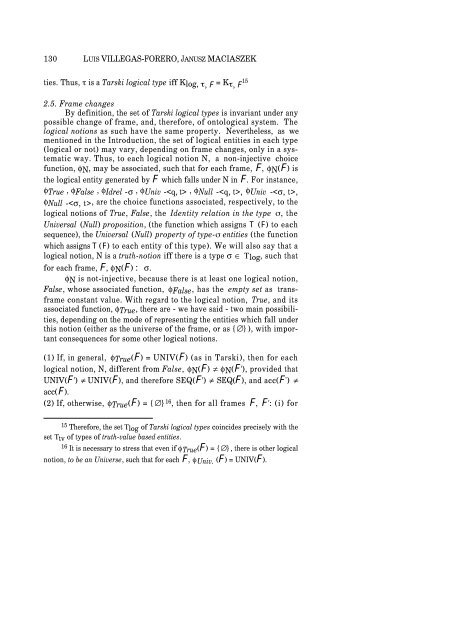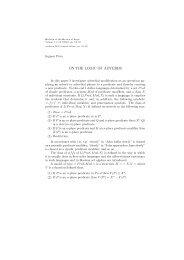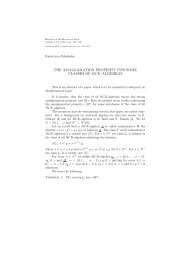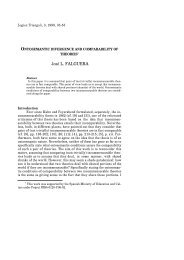Luis VILLEGAS-FORERO, Janusz MACIASZEK
Luis VILLEGAS-FORERO, Janusz MACIASZEK
Luis VILLEGAS-FORERO, Janusz MACIASZEK
Create successful ePaper yourself
Turn your PDF publications into a flip-book with our unique Google optimized e-Paper software.
130 LUIS <strong>VILLEGAS</strong>-<strong>FORERO</strong>, JANUSZ <strong>MACIASZEK</strong><br />
ties. Thus, is a Tarski logical type iff Klog, , F = K , F 15<br />
2.5. Frame changes<br />
By definition, the set of Tarski logical types is invariant under any<br />
possible change of frame, and, therefore, of ontological system. The<br />
logical notions as such have the same property. Nevertheless, as we<br />
mentioned in the Introduction, the set of logical entities in each type<br />
(logical or not) may vary, depending on frame changes, only in a systematic<br />
way. Thus, to each logical notion N, a non-injective choice<br />
function, φN, may be associated, such that for each frame, F, φN(F) is<br />
the logical entity generated by F which falls under N in F. For instance,<br />
φTrue , φFalse , φIdrel -σ , φUniv - , φNull -, φUniv -,<br />
φNull -, are the choice functions associated, respectively, to the<br />
logical notions of True, False, the Identity relation in the type , the<br />
Universal (Null) proposition, (the function which assigns T (F) to each<br />
sequence), the Universal (Null) property of type- entities (the function<br />
which assigns T (F) to each entity of this type). We will also say that a<br />
logical notion, N is a truth-notion iff there is a type σ ∈ Τlog, such that<br />
for each frame, F, φN(F) : σ.<br />
φN is not-injective, because there is at least one logical notion,<br />
False, whose associated function, φFalse, has the empty set as transframe<br />
constant value. With regard to the logical notion, True, and its<br />
associated function, φTrue, there are - we have said - two main possibilities,<br />
depending on the mode of representing the entities which fall under<br />
this notion (either as the universe of the frame, or as {∅}), with important<br />
consequences for some other logical notions.<br />
(1) If, in general, φTrue(F) = UNIV(F) (as in Tarski), then for each<br />
logical notion, N, different from False, φN(F) ≠ φN(F'), provided that<br />
UNIV(F') ≠ UNIV(F), and therefore SEQ(F') ≠ SEQ(F), and acc(F') ≠<br />
acc(F).<br />
(2) If, otherwise, φTrue(F) = {∅} 16 , then for all frames F, F': (i) for<br />
15 Therefore, the set Τlog of Tarski logical types coincides precisely with the<br />
set Τtv of types of truth-value based entities.<br />
16 It is necessary to stress that even if True(F) = {∅}, there is other logical<br />
notion, to be an Universe, such that for each F, Univ. (F) = UNIV(F).






